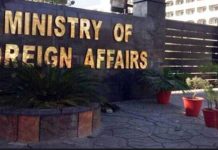DNA
KARACHI, JUL 4 – Pakistan is going to sign trade agreements with Uzbekistan in July to explore over US$90 billion exports potential in central Asia for achieving its unprecedented exports target of US$35 billion set for the fiscal year 2021-22.
For the purpose of central Asia connectivity, Prime Minister Imran Khan is leaving for Uzbekistan on July 13, 2021. During his three-day visit (July 13 to 15), Pakistan and Uzbekistan will sign Transit and Preferential Trade Agreements said the prime minister’s commerce adviser Abdul Razak Dawood in an exclusive talk with the members of the Karachi based Council of Economic and Energy Journalists (CEEJ) in Islamabad.
“Both countries have agreed to allocate dedicated space in Gwadar and Tashkent for establishing warehousing facilities to help each other in the transportation of goods to other regional countries,” he said.
We have planned to transport goods under the TIR Convention because the first-ever truck from Uzbekistan reached Pakistan under the TIR Convention in 48 hours, he said.
“The government is contemplating offering loans to the transporters to update the country’s dilapidated logistics network,” he said.
As the tariff rationalization as an instrument of growth, the government has made products exports competitive in federal budget 2021-22 by rationalizing the tariff lines of over 4000 raw materials which is around 42 percent of total imported raw materials. The focus area for tariff rationalization was active pharmaceutical ingredient (API), poultry, engineering, and textile. The tariff of packaging raw materials, iron and steel, agricultural products would also be rationalized in the next fiscal year, Razak informed.
Talking about the restructuring of the Trade Development Authority of Pakistan (TDAP), he said that some 10 commercial councilors have been removed since September 2018, due to poor performance and now the officials in TDAP, who used to own country-based responsibilities, have been assigned product-based responsibilities to improve their performances,” he said.
“Under the Strategic Trade Policy Framework, the incentives are now linked with product diversification and now the exporters have to show more diversifications in their products to get more incentives from the government,” Razak said.
Pakistan has witnessed record-high exports of US$25.3 billion, including $15.5 billion in textile and $2 billion in IT services in the fiscal year 2020-21, which were nearly $4 billion higher than the US $21.4 billion achieved in 2019-20.
While admitting the impact of the covid situation on the record-high exports, Razak is advocating a ‘high-target, high-achievement approach’, informing that the government has fixed US$35 billion export target, including $28 billion for goods and $7 billion for services for the current fiscal year 2021-22.
“We know it would be a herculean task to achieve because the world is opening and everybody is going to get into the export market but everybody should move and try to make it achievable,” he said.

















